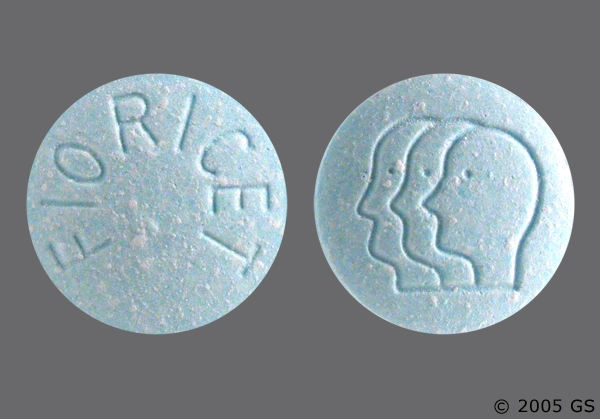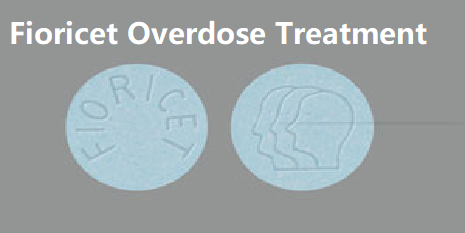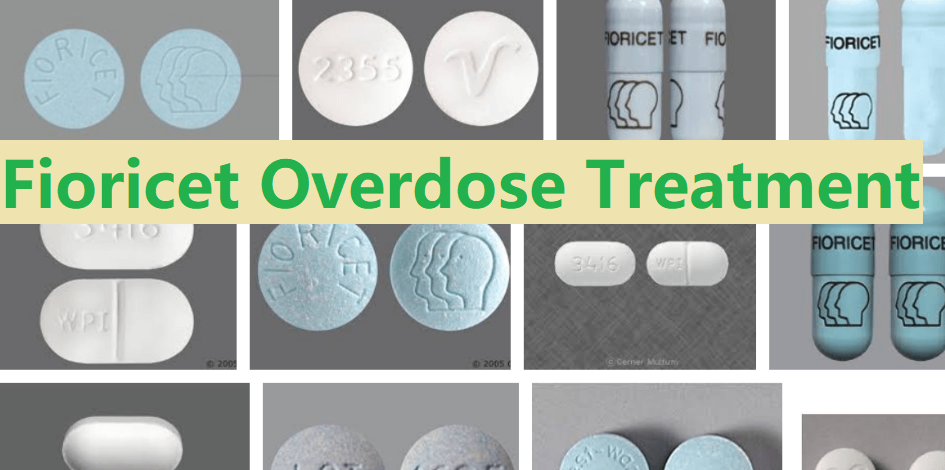Fioricet contains a combination of acetaminophen, butalbital, and caffeine Acetaminophen is a pain reliever and fever reducer. Butalbital is in a group of drugs called barbiturates. It relaxes muscle contractions involved in a tension headache. Caffeine is a central nervous system stimulant. It relaxes muscle contractions in blood vessels to improve blood flow.

Fioricet is used to treat tension headaches that are caused by muscle contractions.
Fioricet may also be used for purposes not listed in this medication guide.
Fioricet® (Butalbital, Acetaminophen, and Caffeine Tablets USP) is supplied in tablet form for oral administration.

Each tablet contains the following active ingredients:
butalbital USP . . . . . . . . . . . .50 mg
acetaminophen USP . . . . . . 325 mg
caffeine USP . . . . . . . . . . . . .40 mg
Inactive Ingredients: crospovidone, FD&C Blue #1, magnesium stearate, microcrystalline cellulose, povidone, pregelatinized starch, and stearic acid.
Fioricet (butalbital, acetaminophen and caffeine) ® (Butalbital,Acetaminophen, and Caffeine Tablets USP) is indicated for the relief of the symptom complex of tension (or muscle contraction) headache.
Evidence supporting the efficacy and safety of this combination product in the treatment of multiple recurrent headaches is unavailable. Caution in this regard is required because butalbital is habit-forming and potentially abusable.
One or 2 tablets every 4 hours as needed. Total daily dosage should not exceed 6 tablets. Extended and repeated use of this product is not recommended because of the potential for physical dependence.
Fioricet® (Butalbital, Acetaminophen, and Caffeine Tablets USP)
Containing 50 mg butalbital, 325 mg acetaminophen, and 40 mg caffeine. Available as light-blue, speckled, round uncoated tablets, engraved “FIORICET (butalbital, acetaminophen and caffeine) ” on one side, and a three-head profile “ ” on other side. Bottles of 100 (NDC 52544-957-01) and 500 (NDC 52544-957-05).
” on other side. Bottles of 100 (NDC 52544-957-01) and 500 (NDC 52544-957-05).
What Are The Ingredients In Fioricet?
A combination medication is a drug which includes two or more pharmaceutical ingredients in a fixed dose. There are three ingredients in standard Fioricet: acetaminophen, butalbital, and caffeine. All three ingredients have different effects which combine to soothe headaches.
- Acetaminophen is a medication which alleviates pain and reduces fever. It’s more widely-known by its brand name, Tylenol. Acetaminophen works by impairing the production of the prostaglandin chemical in the brain. This chemical activates pain signals in the nervous system.
- Butalbital is a sedative barbiturate which stimulates the brain’s production of GABA. This neurotransmitter calms the nervous system by blocking signals among neurons. It also relaxes muscle tension in the head, thereby alleviating headaches. Butalbital is a Schedule III controlled substance in the United States.
- Caffeine is a stimulant which raises a person’s blood pressure. While high blood pressure is not necessarily healthy, low blood pressure worsens headaches by causing blood vessels to expand and push against the brain. By raising raising blood pressure, caffeine causes blood vessels to constrict and increases blood flow. This effect helps relieve headaches.
With these three ingredients at work, Fioricet can be an effective source of headache relief. However, the medication also poses risks for side-effects, overdose, and addiction. For this reason, doctors usually refrain from prescribing Fioricet until safer over-the-counter medications fail to help their patients.
Before taking Fioricet
Do not use Fioricet if you have taken an MAO inhibitor in the past 14 days. A dangerous drug interaction could occur. MAO inhibitors include isocarboxazid, linezolid, phenelzine, rasagiline, selegiline, and tranylcypromine.
You should not use Fioricet if you are allergic to acetaminophen, butalbital, or caffeine, if you have porphyria, or if you have recently used alcohol, sedatives, tranquilizers, or other narcotic medications.
To make sure Fioricet is safe for you, tell your doctor if you have:
-
- liver disease, cirrhosis, a history of alcoholism or drug addiction, or if you drink more than 3 alcoholic beverages per day;
- kidney disease;
- asthma, sleep apnea, or other breathing disorder;
- stomach ulcer or bleeding;
- a history of skin rash caused by any medication;
- a history of mental illness or suicidal thoughts; or
- if you use medicine to prevent blood clots.
It is not known whether Fioricet will harm an unborn baby. If you use butalbital while you are pregnant, your baby could become dependent on the drug. This can cause life-threatening withdrawal symptoms in the baby after it is born. Babies born dependent on habit-forming medicine may need medical treatment for several weeks. Tell your doctor if you are pregnant or plan to become pregnant.
How should I take Fioricet?
Take Fioricet exactly as prescribed. Follow all directions on your prescription label. Do not take more of this medication than recommended. An overdose can damage your liver or cause death. Tell your doctor if the medicine seems to stop working as well in relieving your pain.
Butalbital may be habit-forming. Never share Fioricet with another person, especially someone with a history of drug abuse or addiction. Keep the medication in a place where others cannot get to it. Selling or giving away Fioricet is against the law.
Take Fioricet with food or milk if it upsets your stomach.
Store Fioricet at room temperature away from moisture and heat.
Keep track of the amount of medicine used from each new bottle. Butalbital is a drug of abuse and you should be aware if anyone is using your medicine improperly or without a prescription.
What should I avoid while taking Fioricet?
This medication can cause side effects that may impair your thinking or reactions. Be careful if you drive or do anything that requires you to be awake and alert.
Avoid drinking alcohol. It may increase your risk of liver damage while taking acetaminophen.
Ask a doctor or pharmacist before using any other cold, allergy, pain, or sleep medication. Acetaminophen (sometimes abbreviated as APAP) is contained in many combination medicines. Taking certain products together can cause you to get too much acetaminophen which can lead to a fatal overdose. Check the label to see if a medicine contains acetaminophen or APAP.
While you are taking this medication, avoid taking diet pills, caffeine pills, or other stimulants (such as ADHD medications) without your doctor’s advice.
Acetaminophen / butalbital / caffeine Pregnancy Warnings
Animal reproduction studies have not been conducted on this combination product. Epidemiologic data for acetaminophen, including a population based case-control study from the National Birth Defects Prevention Study (n= 11,610) and data from 26,424 live singleton births have shown no increased risk of major birth defects in children with first trimester prenatal exposure. In 2015, the US Food and Drug Administration released results of their evaluation on published research studies looking at mothers who took acetaminophen (either over the counter or as a prescription product) at any time during their pregnancy and the risk of attention deficit hyperactivity (ADHD) in their babies. They found all studies reviewed had potential limitations in their designs that prevented drawing reliable conclusions. Barbiturates have been reported to readily cross the placental barrier. A 2-day old infant whose mother had taken a butalbital-containing product during the last two months of pregnancy experienced withdrawal seizures; butalbital was found in the infant’s serum. There are no controlled data in human pregnancy.
US FDA pregnancy category C: Animal reproduction studies have shown an adverse effect on the fetus and there are no adequate and well-controlled studies in humans, but potential benefits may warrant use of the drug in pregnant women despite potential risks.
Acetaminophen / butalbital / caffeine Breastfeeding Warnings
Acetaminophen, butalbital, and caffeine are excreted into human milk in small concentrations. The significance of the effects on nursing infants has not been reported, but due to the potential for serious adverse reactions in nursing infants, other agents may be preferred.
A decision should be made to discontinue breastfeeding or discontinue the drug, taking into account the importance of the drug to the mother.
Excreted into human milk: Yes (acetaminophen); Yes (barbiturates); Yes (caffeine)
What should I discuss with my healthcare provider before taking acetaminophen, butalbital, and caffeine?
Do not use this medicine if you have taken an MAO inhibitor in the past 14 days. A dangerous drug interaction could occur. MAO inhibitors include isocarboxazid, linezolid, phenelzine, rasagiline, selegiline, and tranylcypromine.
You should not use acetaminophen, butalbital, and caffeine if you are allergic to it, if you have porphyria, or if you have recently used alcohol, sedatives, tranquilizers, or other narcotic medications.
To make sure acetaminophen, butalbital, and caffeine is safe for you, tell your doctor if you have:
-
- liver disease, cirrhosis, a history of alcoholism or drug addiction, or if you drink more than 3 alcoholic beverages per day;
- kidney disease;
- asthma, sleep apnea, or other breathing disorder;
- stomach ulcer or bleeding;
- a history of skin rash caused by any medication;
- a history of mental illness or suicidal thoughts; or
- if you use medicine to prevent blood clots.
It is not known whether this medicine will harm an unborn baby. If you use butalbital while you are pregnant, your baby could become dependent on the drug. This can cause life-threatening withdrawal symptoms in the baby after it is born. Babies born dependent on habit-forming medicine may need medical treatment for several weeks. Tell your doctor if you are pregnant or plan to become pregnant.
This medicine can pass into breast milk and may harm a nursing baby. Tell your doctor if you are breast-feeding a baby.
How should I take acetaminophen, butalbital, and caffeine?
Follow all directions on your prescription label. Do not take more of this medication than recommended. An overdose can damage your liver or cause death. Tell your doctor if the medicine seems to stop working as well in relieving your pain.
Butalbital may be habit-forming. Never share this medicine with another person, especially someone with a history of drug abuse or addiction. Keep the medication in a place where others cannot get to it. Selling or giving away this medicine is against the law.
Take the medicine with food or milk if it upsets your stomach.
Store at room temperature away from moisture and heat.
Keep track of the amount of medicine used from each new bottle. Butalbital is a drug of abuse and you should be aware if anyone is using your medicine improperly or without a prescription.
What happens if I miss a dose?
Since this medicine is used when needed, you may not be on a dosing schedule. If you are on a schedule, use the missed dose as soon as you remember. Skip the missed dose if it is almost time for your next scheduled dose. Do not use extra medicine to make up the missed dose.
What happens if I overdose?
Seek emergency medical attention or call the Poison Help line at 1-800-222-1222. An overdose of acetaminophen, butalbital, and caffeine can be fatal.
The first signs of an acetaminophen overdose include loss of appetite, nausea, vomiting, stomach pain, sweating, and confusion or weakness. Later symptoms may include pain in your upper stomach, dark urine, and yellowing of your skin or the whites of your eyes.
Overdose symptoms may also include insomnia, restlessness, tremor, diarrhea, increased shallow breathing, uneven heartbeats, seizure (convulsions), or fainting.
What should I avoid while taking acetaminophen, butalbital, and caffeine?
This medication can cause side effects that may impair your thinking or reactions. Be careful if you drive or do anything that requires you to be awake and alert.
Avoid drinking alcohol. It may increase your risk of liver damage while taking acetaminophen.
Ask a doctor or pharmacist before using any other cold, allergy, pain, or sleep medication. Acetaminophen (sometimes abbreviated as APAP) is contained in many combination medicines. Taking certain products together can cause you to get too much acetaminophen which can lead to a fatal overdose. Check the label to see if a medicine contains acetaminophen or APAP.
While you are taking this medication, avoid taking diet pills, caffeine pills, or other stimulants (such as ADHD medications) without your doctor’s advice.
What are the possible side effects of acetaminophen, butalbital, and caffeine?
Get emergency medical help if you have signs of an allergic reaction: hives; difficulty breathing; swelling of your face, lips, tongue, or throat.
In rare cases, acetaminophen may cause a severe skin reaction that can be fatal. This could occur even if you have taken acetaminophen in the past and had no reaction. Stop taking this medicine and call your doctor right away if you have skin redness or a rash that spreads and causes blistering and peeling. If you have this type of reaction, you should never again take any medicine that contains acetaminophen.
Stop using this medicine and call your doctor at once if you have:
-
- confusion, seizure (convulsions);
- shortness of breath;
- a light-headed feeling, like you might pass out; or
- nausea, upper stomach pain, itching, loss of appetite, dark urine, clay-colored stools, jaundice (yellowing of the skin or eyes).
Common side effects may include:
-
- drowsiness, dizziness;
- feeling anxious or restless;
- drunk feeling; or
- sleep problems (insomnia).
This is not a complete list of side effects and others may occur. Call your doctor for medical advice about side effects. You may report side effects to FDA at 1-800-FDA-1088.
What other drugs will affect acetaminophen, butalbital, and caffeine?
Taking this medicine with other drugs that make you sleepy or slow your breathing can cause dangerous or life-threatening side effects. Ask your doctor before taking acetaminophen, butalbital, and caffeine with a sleeping pill, narcotic pain medicine, muscle relaxer, or medicine for anxiety, depression, or seizures.
Other drugs may interact with acetaminophen, butalbital, and caffeine, including prescription and over-the-counter medicines, vitamins, and herbal products. Tell each of your health care providers about all medicines you use now and any medicine you start or stop using.
Is Fioricet Addictive?
Although it’s only a prescription headache medication, Fioricet has the potential to cause addiction. If a person follows their prescription guidelines and uses the medication correctly, the risks of addiction are low. However, if someone takes too much Fioricet, they may develop tolerance to its effects. A person with tolerance to a certain dose of Fioricet will require higher doses of the medication to alleviate their headaches.
When a person with tolerance starts to take more Fioricet, possibly by obtaining more prescriptions, they may eventually become dependent on it. In other words, they may feel unable to get through the day without taking Fioricet, and if they stop, they will experience symptoms of withdrawal. These symptoms arise because their body has grown accustomed to Fioricet in high doses.
If a Fioricet-dependent person attempts to weather withdrawal alone, it’s likely they will take Fioricet again just to relieve the symptoms. This is a hallmark characteristic of addiction. Anyone who compulsively abuses Fioricet to avoid withdrawal likely has an addiction to Fioricet. Additionally, people with an addiction to Fioricet will experience cravings for the medication which further compel them to keeping using it.
Moreover, the ingredient butalbital is an addictive substance in its own right. Butalbital can cause someone to “get high” because it’s a central nervous system depressant. Since butalbital is part of Fioricet, it is possible for someone to abuse Fioricet as a recreational drug. At high doses, Fioricet can intoxicate a person in a manner similar to alcohol. People who abuse Fioricet for this purpose have as much of a risk of developing an addiction as they would have if they repeatedly use an illegal drug.
The Symptoms of Withdrawal
In most cases, Fioricet withdrawal lasts anywhere from 8 hours to three days after the last dose. Withdrawal is the biggest obstacle to overcoming dependence on Fioricet, which is why rehab centers provide detox programs so that people can safely undergo the withdrawal cycle without the risk of relapse. It is best to undergo withdrawal under medical supervision because some withdrawal symptoms are dangerous.
Rebound headaches are the most common symptoms of Fioricet withdrawal. Other symptoms of withdrawal include:
-
-
- Anxiety
- Dizziness
- Insomnia
- Muscle spasms
- Nausea and vomiting
- Rapid emotional changes
- Seizures (in rare cases)
- Tremors
- Weakness
What Are the Possible Side-Effects of Fioricet?
Like any medication, Fioricet can cause side-effects. People who misuse Fioricet or use it compulsively are at greater risk for experiencing the worst side-effects of the medication.
The possible side-effects of Fioricet are:
-
-
- Anxiety
- Dizziness
- Drowsiness
- Feelings of being intoxicated
- Lightheadedness
- Nausea and vomiting
- Shaking and tremors
- Shortness of breath
- Stomach pain
- Trouble sleeping
In some cases, a person who takes Fioricet may develop an allergic reaction to the drug. The symptoms of an allergic reaction are trouble breathing, itching, rashes, intense dizziness, and swelling in the face, throat, and tongue.
What are the Symptoms of a Fioricet Overdose?
While butalbital is the addictive ingredient in Fioricet, acetaminophen is the ingredient which is liable to cause an overdose. Unfortunately, people who misuse Fioricet as a recreational drug or as a way to suppress withdrawal are most likely to suffer an overdose.
When a person overdoses on Fioricet, the acetaminophen will damage their liver. In severe cases, an overdose can even provoke fatal liver failure. For this reason, it is dangerous to take Fioricet together with another medication which contains acetaminophen because it increases the risk of overdose and death. Furthermore, drinking alcohol while taking Fioricet may also inflict liver damage.
A Fioricet overdose is a medical emergency, so it’s important to know the symptoms. An overdose on Fioricet and all other forms of liver failure cause jaundice, the yellowing of the skin and eyes. Other symptoms of an overdose include:
-
-
- Confusion
- Convulsions and seizures
- Fainting
- Irregular heartbeat
- Lack of appetite
- Nausea and vomiting
- Restlessness
- Stomach pain
- Sweating
- Tremors
Fioricet and Codeine
Some formulas for Fioricet contain codeine, a potent and addictive opioid. Codeine enhances the pain-relieving effects of Fioricet, but it also poses additional risks for overdose and addiction. Fioricet is the property of the pharmaceutical firm Actavis, one of three generic drug companies which contributed substantially to the Opioid Epidemic, according to DEA data.
Patients who receive prescriptions for Fioricet should know whether their prescription contains codeine. If codeine is an ingredient in your Fioricet prescription, consider asking for opioid-free medication. If a person misuses Fioricet with codeine, either accidentally or intentionally, they might suffer lethal respiratory depression. Shallow breathing, a slow heart rate, extreme drowsiness, chest pain, and intense confusion are some of the symptoms of overdose on Fioricet with codeine.
Storage
Store below 30°C (86°F); dispense in a tight container.
Important information
You should not use Fioricet if you have porphyria, or if you have recently used alcohol, sedatives, tranquilizers, or other narcotic medications.
Do not use Fioricet if you have taken a MAO inhibitor in the past 14 days. A dangerous drug interaction could occur. MAO inhibitors include isocarboxazid, linezolid, phenelzine, rasagiline, selegiline, and tranylcypromine.
Do not take more Fioricet than is recommended. An overdose of acetaminophen can damage your liver or cause death. Call your doctor at once if you have nausea, pain in your upper stomach, itching, loss of appetite, dark urine, clay-colored stools, or jaundice (yellowing of your skin or eyes).
In rare cases, acetaminophen may cause a severe skin reaction. Stop taking Fioricet and call your doctor right away if you have skin redness or a rash that spreads and causes blistering and peeling.
Where can I get more information?
Your pharmacist can provide more information about acetaminophen, butalbital, and caffeine.








